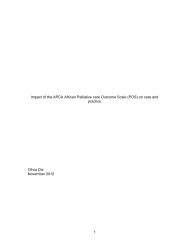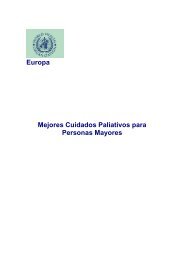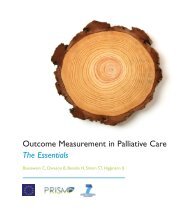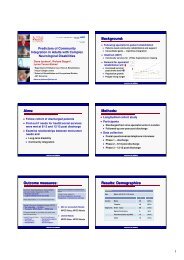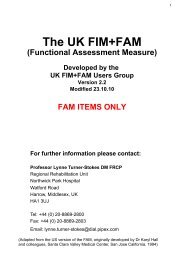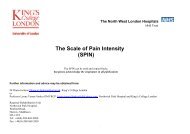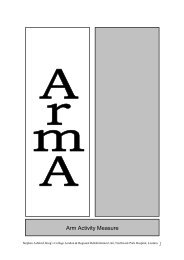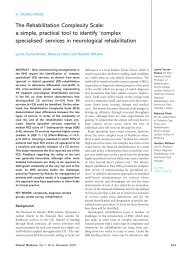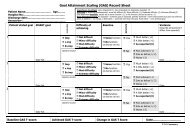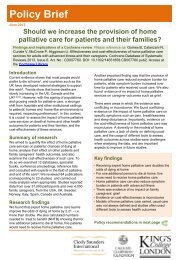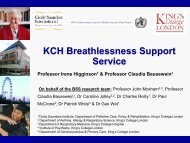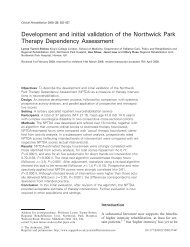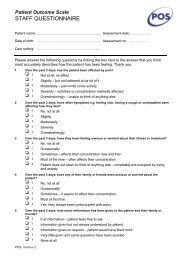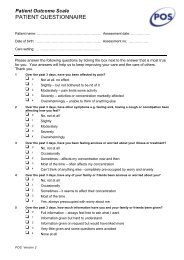2004 - 2007 - Cicely Saunders Institute - King's College London
2004 - 2007 - Cicely Saunders Institute - King's College London
2004 - 2007 - Cicely Saunders Institute - King's College London
Create successful ePaper yourself
Turn your PDF publications into a flip-book with our unique Google optimized e-Paper software.
2.1.1 Improving Care and Services for People<br />
Affected by Cancer<br />
Gysels and Higginson conducted, for the National<br />
<strong>Institute</strong> of Clinical Excellence (NICE), the first comprehensive<br />
robust appraisal of research evidence in<br />
Supportive and Palliative Care in Cancer. Published in<br />
<strong>2004</strong>, this was the culmination of three years research,<br />
building on earlier systematic reviews within the<br />
department. It combined and appraised findings from<br />
339 studies from across the globe. It showed for the first<br />
time evidence for the effectiveness of some components<br />
of supportive and palliative care, especially for multiprofessional<br />
specialist palliative care teams, information<br />
provision and communication skills training 68 .<br />
Communication, co-ordination and patient<br />
education<br />
In an analysis of effectiveness, 12 studies (15 papers)<br />
showed communication skills training improved the<br />
communication of doctors and nurses, as assessed by<br />
self-report and patients, with effect sizes ranging from<br />
0.15 (modest) to 2 (high) 9 . One further study showed<br />
deterioration in outcomes. In depth analysis found that<br />
to be most effective at changing practice (and not just<br />
skills in artificial situations) training programmes need to<br />
take into account and address attitudes and beliefs 9 .<br />
These findings led the Department of Health in the UK<br />
to support a national roll out of communication skills<br />
training, to commit funding to specialist palliative care<br />
services and provided for the first time a research basis<br />
for supportive and palliative care elements of National<br />
Standards in Cancer Care, which now form part of the<br />
National Health Service Peer Review for cancer.<br />
However, there is also the problem of communicating<br />
between services. Farquhar, Barclay and colleagues<br />
studied in depth the concerns of GPs - of most concern<br />
was tardiness (with delays of up to eight days) especially<br />
at three stages in the patient journeys: (1) in the prediagnostic<br />
and diagnostic stage; (2) in the active<br />
treatment phase; and (3) when oncology withdrew and<br />
the focus of care switched back to the community for<br />
the terminal phase 142 , leading to suggestions in the NICE<br />
guidance about the prompt timing of information and the<br />
use of standardised formats.<br />
Interactive technologies and videotapes appear to be a<br />
promising method for patient education in cancer care.<br />
In an analysis of 1,678 patients, educational technologies<br />
showed improved patient knowledge but no change<br />
in patient satisfaction 320 although the analysis identified<br />
problems of heterogeneity (see figure 2.3).<br />
Figure 2.2 The NICE Research evidence produced by the<br />
team at King’s in <strong>2004</strong>, which is now improving how cancer<br />
care and support is provided<br />
Figure 2.3. Meta-analysis showing that video technologies in patient education improve knowledge but not satisfaction<br />
Source: Gysels and Higginson, Supportive Care in Cancer, <strong>2007</strong>;15:7-20<br />
4



